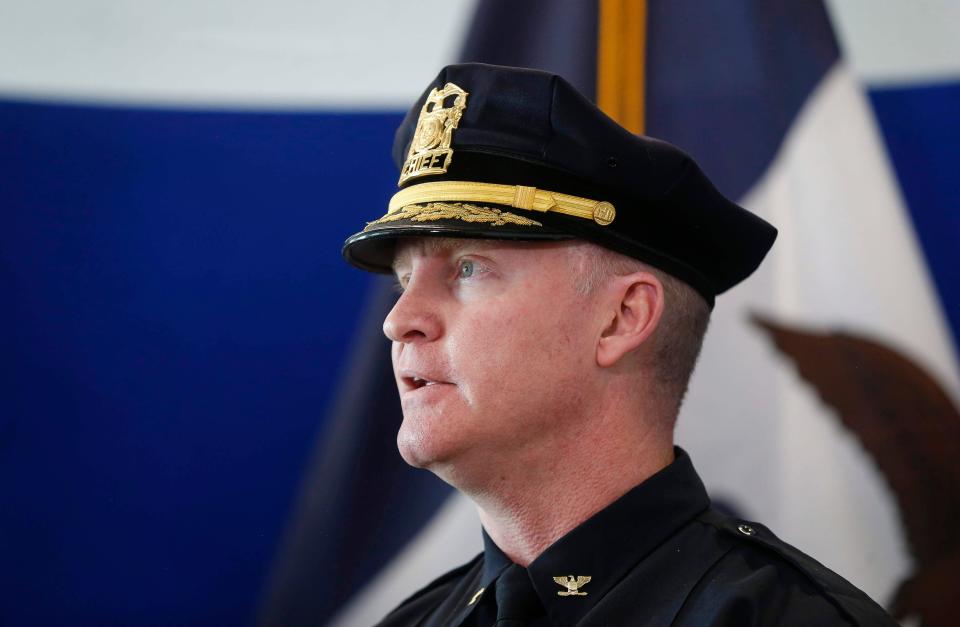Iowa House passes bill targeting traffic enforcement cameras. Here's what it would do:
Iowa House lawmakers have passed a bill placing regulations on automated traffic enforcement cameras in another attempt to resolve a longstanding debate in the Iowa Capitol.
Lawmakers have struggled to pass traffic camera legislation for years, with some urging a complete ban, others pushing for regulations and others seeking to preserve cities' control over the systems.
"While I certainly would prefer to ban these outright, the longer we sit around and do nothing on this, the more we’re seeing these systems being abused across our state," said Rep. Phil Thompson, R-Boone, who chairs the House Public Safety Committee.
The House voted 85-12 to pass House File 2681, sending it to the Senate. A similar bill passed through a Senate committee earlier this year.
Municipalities such as Des Moines and Cedar Rapids, which use traffic enforcement cameras, and law enforcement groups like the Iowa Police Chiefs Association are registered undecided on the bill.
But Des Moines Police Chief Dana Wingert told lawmakers March 20 during a subcommittee meeting on an earlier version of the bill that he appreciates lawmakers discussing a regulatory bill, calling it "long overdue."

"All the things I see in this bill on the regulation side are things we’re already doing, things we’ve been doing since the inception," he said.
Cities and counties would have to get permission from the Iowa DOT to use traffic cameras
The bill would require cities and counties seeking to use automated traffic enforcement cameras to first receive a permit from the Iowa Department of Transportation.
To receive a permit, the local government would be required to submit a justification to the DOT for why traffic enforcement cameras are needed.
The justification must include records of traffic violations at that location for at least one year, the number and severity of traffic collisions at the location, an analysis of traffic speed data, the cause of the safety issues at the location and alternative methods that the local government has either considered or already implemented to improve safety.
Traffic enforcement cameras could be used to issue tickets only when someone is driving more than 10 miles per hour over the speed limit.
Communities with a population of 20,000 or less would not be allowed to use mobile traffic enforcement systems to issue tickets. Mobile systems could still be used to issue warnings for traffic violations.
If the traffic enforcement cameras store pictures of license plates, the images must be deleted within 30 days unless they are part of an ongoing criminal investigation.
Local governments must place signs from 500 to 1,000 feet in advance of any traffic enforcement cameras, notifying drivers that the cameras are in use.
Every year by March 1, local governments would need to submit a report to the DOT detailing the number of collisions and citations at any locations where traffic enforcement cameras are in use.
People who are ticketed could provide evidence that they were not driving at the time the ticket was issued, if they provide the name and address of the person who was driving the car.
The bill also lays out a process regarding whether cities that currently use traffic cameras can continue to do so.
Cities that already used traffic enforcement cameras prior to Jan. 1 can continue them while they wait for the Department of Transportation to approve or deny their application for a permit to continue operating the system. They must submit that application by July 1.
Cities that began using traffic cameras on or after Jan. 1 of this year will not be given a permit by the Department of Transportation until July 1, 2026, at the earliest.
How much money have cities made from traffic camera tickets?
Local governments could use money collected from traffic enforcement cameras only to fund transportation infrastructure improvement or to offset costs for operating their police and fire departments.
An analysis of the bill by the nonpartisan Legislative Services Agency shows Cedar Rapids issued the most tickets and took in the most revenue in fiscal year 2023 of any city in Iowa that uses traffic cameras.
Cedar Rapids issued 169,696 tickets and collected 94,037 fines. The city took in $7.2 million, which it designated to its general fund, and the company running the cameras took in $1.8 million.
Des Moines issued 125,768 tickets in fiscal year 2023 and collected 84,991 fines. The city took in $3.6 million, which it spent on its public safety radio system, and the company running the cameras took in $1.9 million.
How much can Iowans be fined when ticketed by a speed camera?
The legislation would also standardize the fines that drivers could receive for speeding if they are ticketed using a traffic camera.
The fines for speeding violations would be:
$75 for driving 11-20 miles per hour above the speed limit.
$100 for driving 21-25 miles per hour above the speed limit.
$250 for driving 26-30 miles per hour above the speed limit.
$500 for driving more than 30 miles per hour above the speed limit.
The bill doubles those fine for speeding in a work zone.
Iowa lawmakers speak for and against traffic cameras in debate
House lawmakers spoke both for and against traffic cameras during Tuesday's debate.
Rep. Sami Scheetz, D-Cedar Rapids, who supported the bill, said his city has used traffic cameras to cut down on traffic accidents along Interstate 380 and elsewhere. Scheetz said using cameras also reduces the number of traffic stops officers make along dangerous stretches of road.
"This technology not only saves lives by reducing high speed accidents, but it also protects our first responders by minimizing risky traffic stops," Scheetz said.

Rep. John Wills, R-Spirit Lake, offered an amendment to the bill that would have banned traffic enforcement cameras altogether. The amendment failed to pass, with 47 members in favor and 50 opposed.
Wills said he believes traffic cameras violate the U.S. Constitution's Fifth Amendment due process provisions and Sixth Amendment right to be confronted by a person's accuser. He ultimately voted in favor of the bill.
"These traffic cameras are speed traps," he said. "I don’t believe they’re constitutional."
Editor's note: A previously published version of this story incorrectly reflected the vote of Rep. Sami Scheetz, D-Cedar Rapids, who voted in favor of the final bill.
Stephen Gruber-Miller covers the Iowa Statehouse and politics for the Register. He can be reached by email at sgrubermil@registermedia.com or by phone at 515-284-8169. Follow him on Twitter at @sgrubermiller.
This article originally appeared on Des Moines Register: What to know about the Iowa House's bill to regulate traffic cameras

